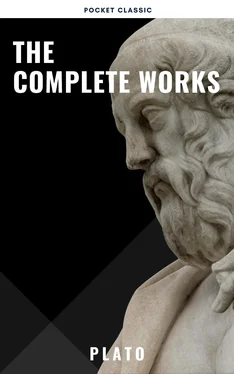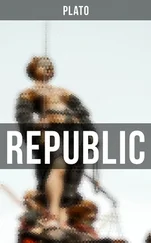‘Holding a sceptre of gold, and giving laws to the dead.’
Now I, Callicles, am persuaded of the truth of these things, and I consider how I shall present my soul whole and undefiled before the judge in that day. Renouncing the honours at which the world aims, I desire only to know the truth, and to live as well as I can, and, when I die, to die as well as I can. And, to the utmost of my power, I exhort all other men to do the same. And, in return for your exhortation of me, I exhort you also to take part in the great combat, which is the combat of life, and greater than every other earthly conflict. And I retort your reproach of me, and say, that you will not be able to help yourself when the day of trial and judgment, of which I was speaking, comes upon you; you will go before the judge, the son of Aegina, and, when he has got you in his grip and is carrying you off, you will gape and your head will swim round, just as mine would in the courts of this world, and very likely some one will shamefully box you on the ears, and put upon you any sort of insult.
Perhaps this may appear to you to be only an old wife’s tale, which you will contemn. And there might be reason in your contemning such tales, if by searching we could find out anything better or truer: but now you see that you and Polus and Gorgias, who are the three wisest of the Greeks of our day, are not able to show that we ought to live any life which does not profit in another world as well as in this. And of all that has been said, nothing remains unshaken but the saying, that to do injustice is more to be avoided than to suffer injustice, and that the reality and not the appearance of virtue is to be followed above all things, as well in public as in private life; and that when any one has been wrong in anything, he is to be chastised, and that the next best thing to a man being just is that he should become just, and be chastised and punished; also that he should avoid all flattery of himself as well as of others, of the few or of the many: and rhetoric and any other art should be used by him, and all his actions should be done always, with a view to justice.
Follow me then, and I will lead you where you will be happy in life and after death, as the argument shows. And never mind if some one despises you as a fool, and insults you, if he has a mind; let him strike you, by Zeus, and do you be of good cheer, and do not mind the insulting blow, for you will never come to any harm in the practice of virtue, if you are a really good and true man. When we have practised virtue together, we will apply ourselves to politics, if that seems desirable, or we will advise about whatever else may seem good to us, for we shall be better able to judge then. In our present condition we ought not to give ourselves airs, for even on the most important subjects we are always changing our minds; so utterly stupid are we! Let us, then, take the argument as our guide, which has revealed to us that the best way of life is to practise justice and every virtue in life and death. This way let us go; and in this exhort all men to follow, not in the way to which you trust and in which you exhort me to follow you; for that way, Callicles, is nothing worth.
PERSONS OF THE DIALOGUE:Socrates, who is the narrator of the Dialogue to his Companion. Hippocrates, Alcibiades and Critias. Protagoras, Hippias and Prodicus (Sophists). Callias, a wealthy Athenian.
THE SETTING:The House of Callias.
COMPANION: Where do you come from, Socrates? And yet I need hardly ask the question, for I know that you have been in chase of the fair Alcibiades. I saw him the day before yesterday; and he had got a beard like a man,—and he is a man, as I may tell you in your ear. But I thought that he was still very charming.
SOCRATES: What of his beard? Are you not of Homer’s opinion, who says
‘Youth is most charming when the beard first appears’?
And that is now the charm of Alcibiades.
COMPANION: Well, and how do matters proceed? Have you been visiting him, and was he gracious to you?
SOCRATES: Yes, I thought that he was very gracious; and especially to-day, for I have just come from him, and he has been helping me in an argument. But shall I tell you a strange thing? I paid no attention to him, and several times I quite forgot that he was present.
COMPANION: What is the meaning of this? Has anything happened between you and him? For surely you cannot have discovered a fairer love than he is; certainly not in this city of Athens.
SOCRATES: Yes, much fairer.
COMPANION: What do you mean—a citizen or a foreigner?
SOCRATES: A foreigner.
COMPANION: Of what country?
SOCRATES: Of Abdera.
COMPANION: And is this stranger really in your opinion a fairer love than the son of Cleinias?
SOCRATES: And is not the wiser always the fairer, sweet friend?
COMPANION: But have you really met, Socrates, with some wise one?
SOCRATES: Say rather, with the wisest of all living men, if you are willing to accord that title to Protagoras.
COMPANION: What! Is Protagoras in Athens?
SOCRATES: Yes; he has been here two days.
COMPANION: And do you just come from an interview with him?
SOCRATES: Yes; and I have heard and said many things.
COMPANION: Then, if you have no engagement, suppose that you sit down and tell me what passed, and my attendant here shall give up his place to you.
SOCRATES: To be sure; and I shall be grateful to you for listening.
COMPANION: Thank you, too, for telling us.
SOCRATES: That is thank you twice over. Listen then:—
Last night, or rather very early this morning, Hippocrates, the son of Apollodorus and the brother of Phason, gave a tremendous thump with his staff at my door; some one opened to him, and he came rushing in and bawled out: Socrates, are you awake or asleep?
I knew his voice, and said: Hippocrates, is that you? and do you bring any news?
Good news, he said; nothing but good.
Delightful, I said; but what is the news? and why have you come hither at this unearthly hour?
He drew nearer to me and said: Protagoras is come.
Yes, I replied; he came two days ago: have you only just heard of his arrival?
Yes, by the gods, he said; but not until yesterday evening.
At the same time he felt for the truckle-bed, and sat down at my feet, and then he said: Yesterday quite late in the evening, on my return from Oenoe whither I had gone in pursuit of my runaway slave Satyrus, as I meant to have told you, if some other matter had not come in the way;—on my return, when we had done supper and were about to retire to rest, my brother said to me: Protagoras is come. I was going to you at once, and then I thought that the night was far spent. But the moment sleep left me after my fatigue, I got up and came hither direct.
I, who knew the very courageous madness of the man, said: What is the matter? Has Protagoras robbed you of anything?
He replied, laughing: Yes, indeed he has, Socrates, of the wisdom which he keeps from me.
But, surely, I said, if you give him money, and make friends with him, he will make you as wise as he is himself.
Would to heaven, he replied, that this were the case! He might take all that I have, and all that my friends have, if he pleased. But that is why I have come to you now, in order that you may speak to him on my behalf; for I am young, and also I have never seen nor heard him; (when he visited Athens before I was but a child;) and all men praise him, Socrates; he is reputed to be the most accomplished of speakers. There is no reason why we should not go to him at once, and then we shall find him at home. He lodges, as I hear, with Callias the son of Hipponicus: let us start.
I replied: Not yet, my good friend; the hour is too early. But let us rise and take a turn in the court and wait about there until day-break; when the day breaks, then we will go. For Protagoras is generally at home, and we shall be sure to find him; never fear.
Читать дальше












